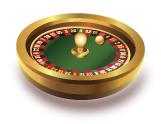Roulette is a game of chance. But what is luck at roulette, and can you measure it?
Most people who enjoy a flutter onthe tables know that the casino has an edge on its games. And that the house advantage is how the casinos make their money.
But not everyone understands the long term nature of the casino edge. It's an average of casino wins minus the losses over a big number of bets. It has nothing to do with what may occur at an individual table or session.
Volatility is an important concept to understand when thinking of individual results. Volatility is a statistical term describing the jumps in your fortunes on individual events.
Take a £1 bet on a single number for example and a £1 on the red on European roulette. Both bets have have a 2.6% edge. So, mathematically speaking, anyway, average out all of the bets across all of the tables across a month and the casino wins 2.6 pence while the players lose 2.6 pence cents per pound wagered. But the casino boss doesn´t actually collect 2 and a half pence a spin from everybody who plays. Of course not- it´s an average.
With £1 single number bets, on average 36 out of 37 players lose £1 while one lucky punter out of 37 wins £35. The house gets the spare pound. With £1 on a the red, 18 players win £1 and 18 players lose £150 (the house wins when the zero comes up). The 2.6 pence gets lost in the wash.
These 2 types of bets are obviously very different, despit having the same house edge. They are a way of choosing the amount of risk and reward you want to combine.
This casino volatility can be described with mathmatics of course. One of the key bits that determine volatility is the "standard deviation." This is the amount by which your bankroll swings in value during play -- so for example during a visit or session at the table. Riskier probabilities or payoffs mean higher standard deviations and bigger bankroll swings; Lower risk bets mean lower swings but also smaller returns on your money. Another building block of of volatility is skewness- another statistical term. This measures the direction in which Lady Luck is running- the direction that your bankroll is swinging. Positive skewness means losts of small drops and a big win every now and then. Negative skewness is the opposite.
So next time you play roulette, or any game for that matter- think about what type of bets you are going to play before you hit the tables, and think about the volatility and skewness of the different types of bets (and games) you are playing and experiencing in your session.
Are you going to try and grind out a profit (or minimise your loss) on low standard deviation bets like the even money bets? (black/red etc). Or are you going for the lottery approach with high standard deviation bets like the single number bet, hoping to catch a 35-1 winner before you have laid down 35 units. It´s up to you, but the one thing we always recommend it to make your plan and stick to it- and that includes having a session cut off point where you take your profits or stop when you have hit your budget for the day.
Play Live Roulette NOW- Real Dealers!

